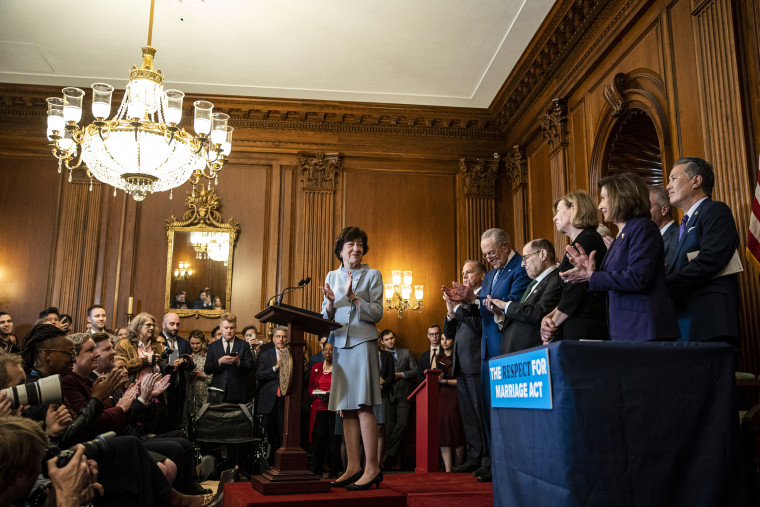WASHINGTON — At the beginning of the year, Senate Majority Leader Chuck Schumer was staring into a political abyss: Sen. Joe Manchin, D-W.Va., had just knifed President Joe Biden’s signature legislation, and Schumer's push to change the Senate rules to pass voting rights legislation was similarly killed by Manchin and another centrist Democrat.
With inflation on the rise and the midterm elections on the horizon, Democrats’ fears of suffering a massive blowout were rising. Some within the party were privately pointing fingers at Schumer. The 50-50 majority, which has been unkind to Senate leaders in the past, seemed to be slipping from his grasp.
“Everyone said Democrats are gonna lose a whole ton of seats,” Schumer said during a wide-ranging interview in his Capitol Hill office. “People said, ‘Well, Democrats — can they get anything done?’ At that point, it was a down moment.”
A year later, the New York Democrat is taking a victory lap.
He cut a deal with Manchin to revive major portions of Biden’s landmark bill, which became the largest investment in combating climate change in U.S. history. He oversaw a string of major bipartisan victories, including the most significant gun safety law in 30 years, a priority of his that appeared all but dead. And he defied the long odds of history by expanding his majority in the midterms.
“The only dispute: Is it the most productive two years in 50 years since the Great Society, or the most productive in 100 years since the New Deal?” Schumer said.
It’s not all good news for Schumer. Democrats may have held the Senate, but they narrowly lost the House majority to Republicans, which could spell the end of the party’s biggest legislative goals. And despite Schumer’s confidence that he’ll hold the Senate majority again in 2024, the map presents enormous challenges.
Schumer expressed no regrets about how he dealt with Manchin, including during Build Back Better talks last year when he concealed a letter in which the West Virginia centrist vowed not to spend as much as the House was considering. Many Democratic staffers were furious with Schumer, saying they wasted months of valuable time on a fool’s errand. Schumer’s aides said at the time he was trying to change Manchin’s mind.
“Look, when one way doesn’t work you try another,” Schumer said.
In dark moments like the failure of the Build Back Better Act and voting rights legislation, Schumer said he remembers two lessons from his late father, Abraham Schumer, who died last year at 98. “He taught me, first, always try to help people who need help. The second thing he taught me was, when you’re engaging in a major endeavor, look in your heart, make sure it’s the right thing, and then persist and persist and persist and never give up.”
Schumer said he sought to “resuscitate” the Democrats-only bill after a “few months of a cooling off period” in early 2022. “I always kept my respectful relationship with Manchin, even though we disagreed on a whole lot.” He flashed his flip phone as “my secret to success.”
Apart from that bill, Congress has racked up bipartisan achievements that include a renewal of the Violence Against Women Act, the CHIPS and Science Act to boost domestic industries and counter China, an overhaul of the Postal Service to improve its budget, a measure to assist veterans exposed to toxic burn pits.
Some Republicans at the center of various deals say Schumer — who rose to prominence in part while cultivating a reputation as a sharp-elbowed partisan — gave them the space to operate.
“He was involved in CHIPS. I worked with him closely on that,” Sen. Rob Portman, R-Ohio, said. On the rest, he said, Schumer’s role was “mostly sitting back and allowing us to do our bipartisan work.”
Others don't have anything positive to say about him.
Asked about Schumer’s role in the bipartisan pursuits and centrist deal-making, Sen. Susan Collins, R-Maine — who has a famously frosty relationship with the New York Democrat after he tried to oust her in the 2020 election — chuckled: “I don’t really think I’m going to get into that at this point. We’ve done a lot, and I’m happy about it.”

Still, for Democrats eager to campaign on achievements and make good on President Joe Biden’s promises of a return to normalcy, the legislative successes were an essential ingredient of their campaign messages in 2022, from Arizona to New Hampshire.
“One of the reasons we won the election was there were a good chunk of Republicans and more conservative-leaning independents who said, 'Wow, they’re finally doing things that I care about — not talking about these left-wing things that Fox News says they’re talking about,'” Schumer said. “Helping the veterans, gun safety, jobs in America, dealing with China, environment, going after prescription drugs, more health care. It worked.”
Along the way, the Senate confirmed Justice Ketanji Brown Jackson as the first Black woman to sit on the Supreme Court — the centerpiece of the Biden-Schumer project to reshape the federal courts.
Since the election, Congress has passed a law that federally protects same-sex marriage in case the Supreme Court overturns that right. That was personal to Schumer, whose daughter is married to a woman.
And four congressional aides say significant election reform legislation to prevent another Jan. 6 is on track to be added to a government funding bill that Congress aims to pass by the end of the year. The measure, a major rewrite of an 1887 law, would make it harder for presidential candidates to overturn election results.
Over the next two years, Schumer said he’s looking forward to working with incoming House Minority Leader Hakeem Jeffries, predicting his fellow Brooklynite will be a “very, very good” leader for the Democratic caucus. Schumer said he isn’t giving up on working with moderate House Republicans, including some who won swing districts in his home state of New York.
“My goal — I think there’s going to be a whole chunk of Republicans in the House and Senate who realize that the MAGA way doesn’t work. And I hope to work with them to get real things done. And I’ve said this to Mitch McConnell,” Schumer said. “I think they will see for themselves: ‘I don’t have to do this.’ Following MAGA right means they’ll lose their re-election.”

